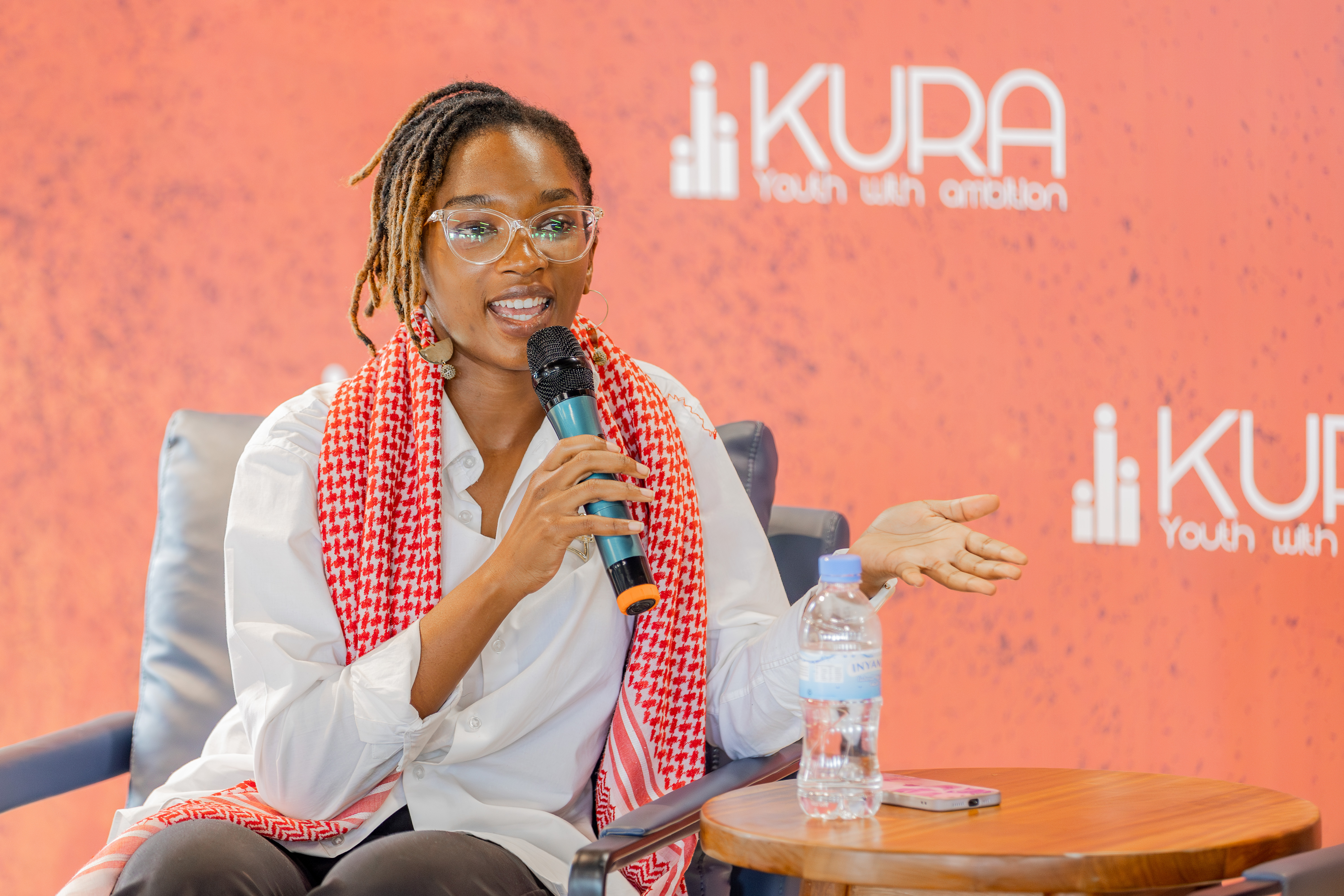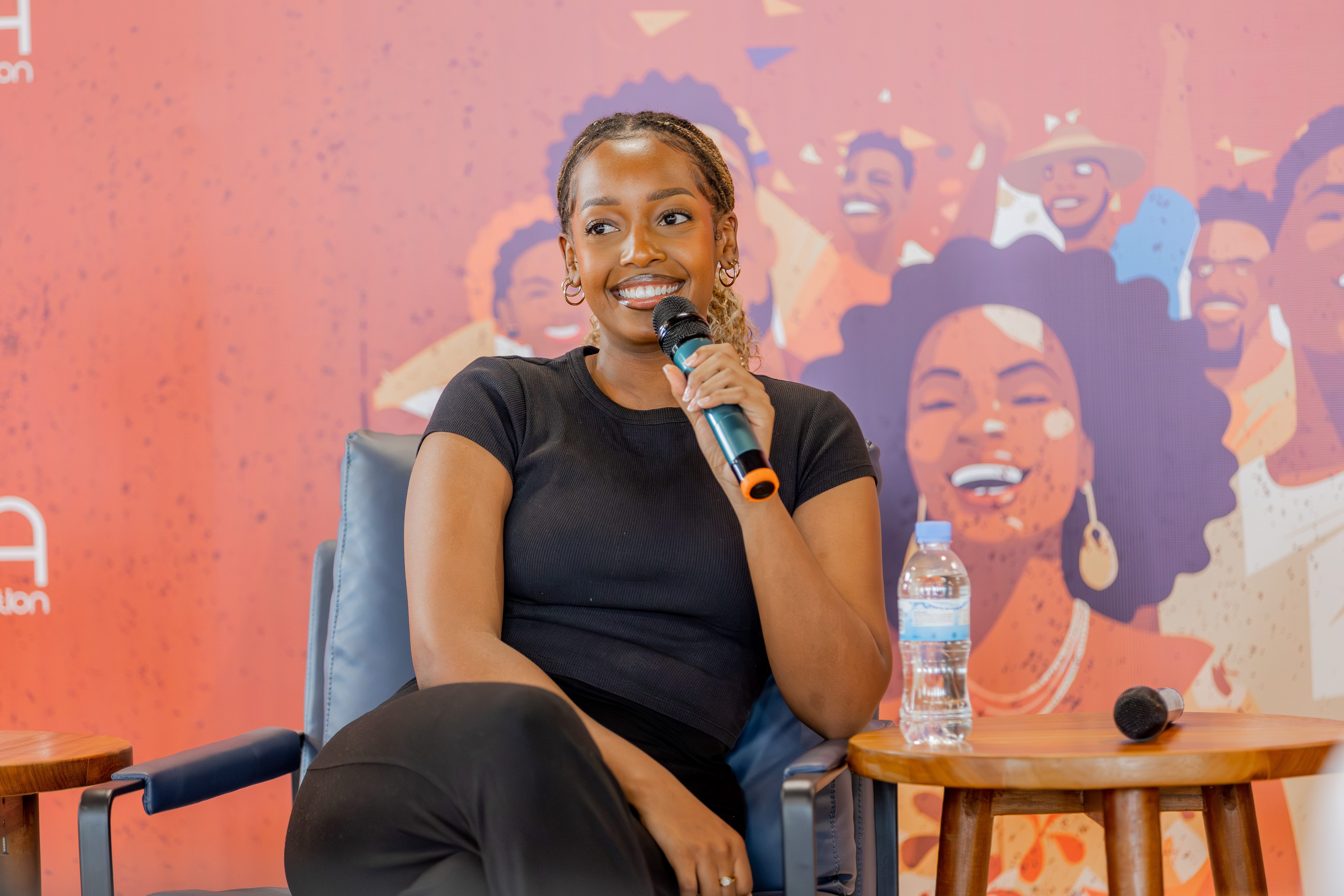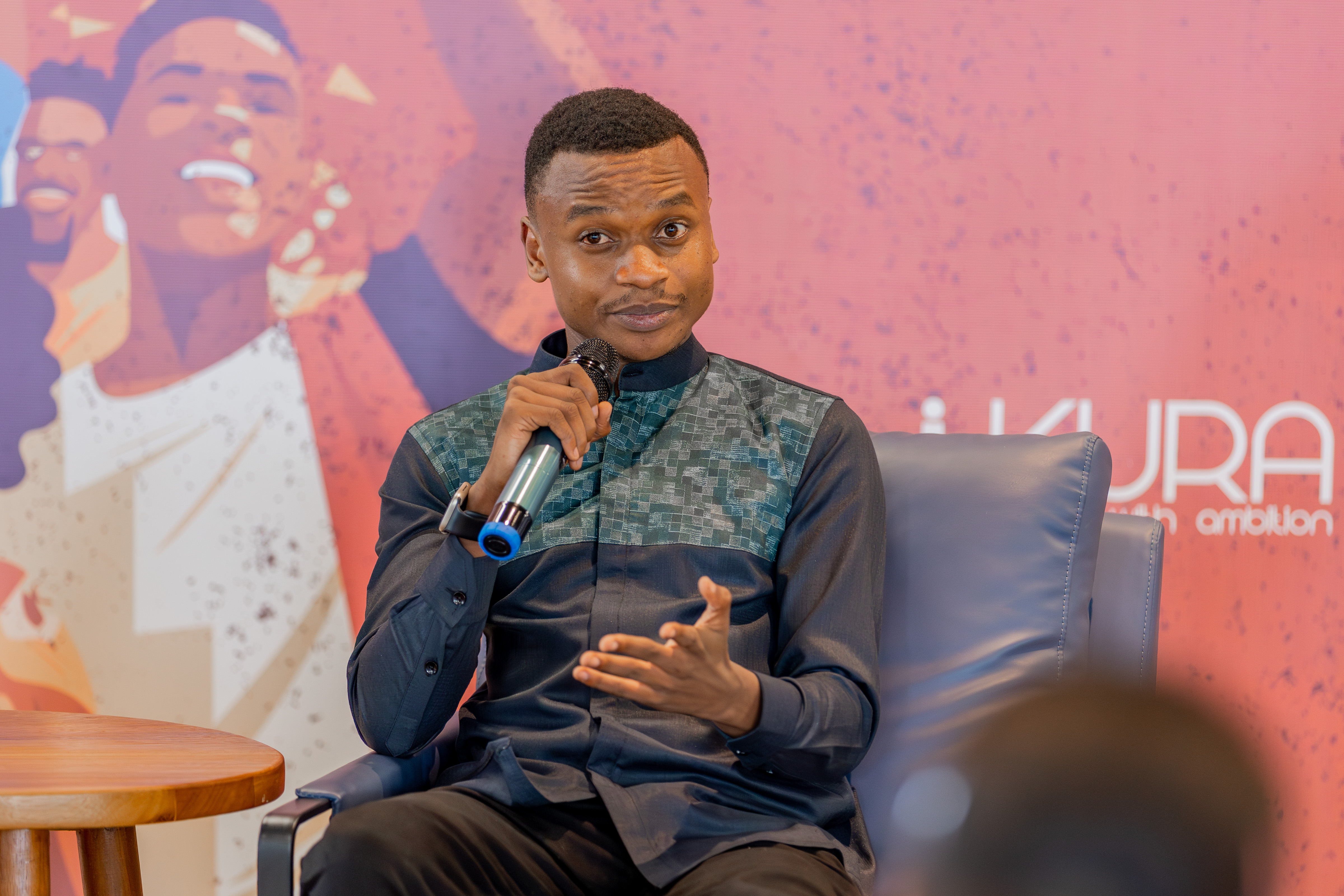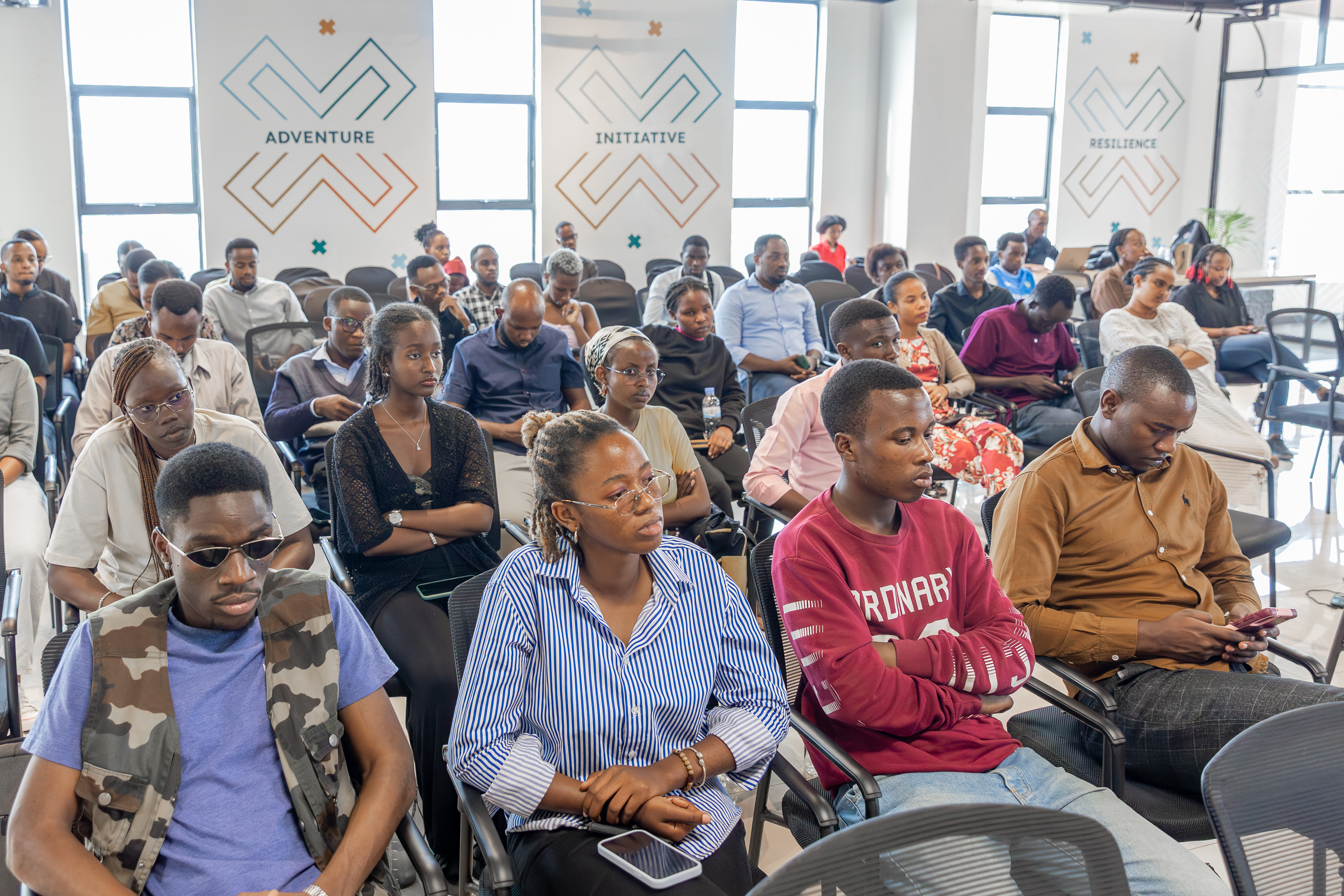In the last few years many young people were inspired to take the entrepreneurship path and find pathways out of poverty, but few get the proper guidance necessary for success. In the first ever KURA event, three young entrepreneurs shared their journeys and advised on the best practises for young but ambitious entrepreneurs.
On may 30th, KURA organized it’s first ever event themed ‘For Us, with Us”, the event aimed at empowering young people through open discussions, generating actionable insights, and ultimately creating solutions that resonate with the aspirations and concerns of the youth today.
More than 100 young people attended the event and were inspired by three dynamic speakers. Uwase Dominique Alonga, the founder of Imagine We, Cheyenne Muvunyi the founder and CEO of Glowforce and Patrick Afrika the founder of Afrolago, shared insights on what made their success and the challenges they faced that young people should be aware of.
Documenting her journey, Uwase Dominique Alonga says she grew up in a story telling house hold. Escaping the genocide against the Tutsi and instability in Congo, Alonga’s mother used storytelling as a way to shield her children from the realities of the world.
Alonga grew up loving books and stories. After going to university abroad and coming back to Rwanda and realizing the massive movement of young people contributing to the country, she was inspired to do something as well.
She says, “The original Idea was for Imagine We to provide books to schools and to provide mutuelle de santé to kids who read them.”
They called for people to donate books but there were no books in Rwanda at the time. She posted a youtube video calling for people abroad to donate books and a school in the US reached out and donated at the end of the month 10,000 books.
They distributed books to 27 schools in Rwanda and served over 25,000 children.
They established a small library at their offices where children could come read books but the children did not like them, “the kids told us the people in the books did not look like them.”
That is when her and the team decided to release one single book that is Rwandan. A book that tells African stories in an African way. The kids loved it and that was the beginning of Imagine We.
Alonga had a friend who was making documentaries and wanted a voice over artist. He had a house he transformed into an office and one of his rooms was used as storage. She asked him if she could get the room and she would in turn do the documentaries for free. That is how Imagine We established their first office.

Alonga and Cheyenne Muvunyi have something in common. They both believe that representation matters.
Early on Cheyenne Muvunyi loved content creation, she was watching different creators but noticed a gap.
“Eveyone I was watching at the time was foreign, I thought that maybe there is a gap I can bridge between them and my community. People thought it was weird nobody wanted to subscribe to my channel, they thought it did not make sense to them. Just because it was not trending. I understood that not everybody was going to get it and those that did not get it were not my target audience. My target audience were the people who understood what I was doing,” she said.
She started creating content while simultaneously launching her own business, Glow Force, a skin care brand.
She asked for a 300,000 Frw loan from her parents but they said, “For what?”, unfortunately at the time they did not understand what it was for they did not believe in the idea.
She saved for 6 months and she had 150,000 Frw and her cousin Karen Bugingo who is also an entrepreneur was the main person who believed in her dream and loaned her another 150,000 Frw which was a lot of money that she also could use for other things. “We launched at 10 AM and that evening at 5 PM I sent her back the amount.”

Patrick Afrika also had someone believe in him. Patrick learnt how to make shoes from his Dad, he understood very quickly that this is a skill that he can quickly monetize. He started making shoes for his classmates while he was still in Ordinary Level of highschool.
After finishing high school, he decided to open his company ‘Afrolago’ in 2020. He enlisted the help of his father who had few equipments and he got started. He decided to also work and train people living with disabilities since he wanted to impact this community. Now he has employed 12.
All three of these entrepreneurs have something in common, the road was not smooth and there were challenges. For Patrick it was communicating with employees but to also get raw materials needed to make the shoes. His solution was to partner with with an affordable manufucturer in Kenya.
He also thought that some of his friends would be supportive but he quickly saw it was a different reality. He says, “You think they are going to be your first client but unfortunately it is very different, I expected them to suppport me in simple things like posting on instagram or whatsapp but he acts like a celebrity. Some even want discounts because we know each other.. Which something it was different than the support I get from people I do not know.”

Cheyenne Muvunyi had to also face a lot of challenges, rejection and gender biases. Some people would not partner with her because she was a very young woaman. They woud often be surprised to find out she is the owner of the company.
Muvunyi also faced an operational issue, “ because geographical location and being landlocked, certain things are more expensive.”
Her key to sustain her business was improving her product so that people can actually see it was worth the price.
She said, “We get a lot of feedback when we can and ofcourse whatever critiques we get we apply and use it to improve the product. We are very lucky to have a lot of feedback from the people. And now we have 69% customer return rate.”
Her advise to young people is to not give up on their ideas. She says, “I was so ready to give up. If you have a passion for something, it si going to ge so difficult to the point where you want to give up but don’t. Facing rejection is a very painful thing but it is redirection to a better opportunity that is better suited for you.”
For Dominque Alonga also had her fare share of challenges. She faced operational challenges such as hiring the right people but she also faced gender biases.
She said, “I was 22 years old, I would look for partners and they would say maybe just get married, all these gender specific issues that make them not want to believe in me. These things young people face. I am very grateful that now with the government’s push for women’s empowerment it is no longer as big of an issue. “
“When considering entrepreneurship things will happen, crazy clients, crazy employees, I had people who told me, I do not understand why you get paid more than me when I am a man. It was 2016 and I actually paid them more than me. Life can also happen, Covid hit us we did not know how rent was going to be paid because we were not working. You will face challenges but there are opportunities out there for you. Give yourself a chance.”
She advises young people to, “hire very slowly if you reach a point where you want to hire, really take time.”
She also believes that mentorship is an essential part of being an entrepreneur. She said, “Make sure you meet people whose floor is your ceiling. we produce 50 books all year, it is what Penguin Publishers, our role model publishes in one hour. When they mentor us, we were producing 8 books a year now we are already at 50 books so make sure that people who’s floor, is your ceiling, you would dream of it, linkedin them, instagram them find them get them to give you one hour.”



